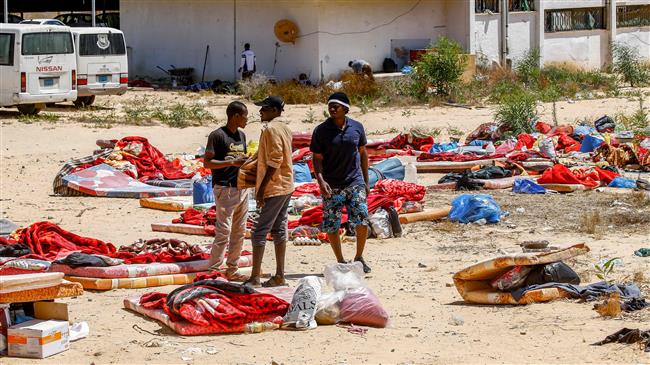UN accuses Libyan guards of shooting refugees fleeing Tripoli airstrikes
“Airstrikes may be war crime”
“There are reports that following the first impact, some refugees and migrants were fired upon by guards as they tried to escape,” said the OCHA report, which came a day after UN authorities emphasized that the airstrikes -- by renegade Libyan General Khalifa Haftar – may have constituted a war crime.
“The number of civilian casualties caused by the conflict has almost doubled as the result of this single attack,” added the OCHA report.
Libya remains one of the major departure points for African refugees fleeing poverty and war to reach Italy by boat, though many of them are intercepted at sea and brought back by Libyan coast guard in a controversial arrangement between the European Union and the UN-recognized Libyan government based in capital Tripoli.
‘Airstrikes may be war crime’
“There are reports that following the first impact, some refugees and migrants were fired upon by guards as they tried to escape,” said the OCHA report, which came a day after UN authorities emphasized that the airstrikes -- by renegade Libyan General Khalifa Haftar – may have constituted a war crime.
“The number of civilian casualties caused by the conflict has almost doubled as the result of this single attack,” added the OCHA report.
Libya remains one of the major departure points for African refugees fleeing poverty and war to reach Italy by boat, though many of them are intercepted at sea and brought back by Libyan coast guard in a controversial arrangement between the European Union and the UN-recognized Libyan government based in capital Tripoli.

The UN has repeatedly emphasized that Libya is not a safe place for asylum seekers rescued at sea to be returned back to and has demanded the refugees be released and provided with safe shelter.
However, the world body has refused to directly censure Italy for shutting its doors to the refugees, only calling on European states to help resolve the conflict in Libya in order to discourage asylum seekers from taking perilous sea journeys.
Refugees detained in Tripoli with EU's blessing
The Tripoli-based government categorically denied the OCHA report in a Thursday statement in which Interior Minister Fathi Ali Bashagha further underlined that the Government of National Accord (GNA) was considering shutting down all detention centers for refugees and releasing thousands of the inmates held in Tripoli under appalling conditions with EU’s knowledge and approval in its bid to contain the flow of asylum seekers to its borders.
Meanwhile, bodies were still being recovered from the rubble at the site of the bombing, suggesting that casualties could further increase.

The declared 53 dead in Tuesday’s bombing, was the highest publicly reported toll from an air strike or shelling since eastern Libyan forces -- under Haftar’s command -- launched a ground and aerial offensive three months ago to capture Tripoli, the base of Libya’s UN-recognized government in the northwest of the country.
US weaponry captured from Haftar's forces
The airstrikes came just days after military officials with the Tripoli government declared seizure of sophisticated US missiles and weaponry from the UAE at a base they captured from forces allied to Haftar in the south of the capital.
The GNA forces retook the southern strategic town of Gharyan, home to the main supply base of eastern forces attacking the capital, from Haftar's self-styled Libyan National Army (LNA) on Wednesday.
The GNA announced on Saturday that among the weaponry its forces had seized were four US-made Javelin anti-tank missiles packed in wooden crates marked "armed forces of the United Arab Emirates."
The GNA officials further said the markings indicated that the missiles – jointly manufactured by giant American weapon makers Raytheon and Lockheed Martin – had originally been sold to the United Arab Emirates (UAE), a major buyer of US arms and one of Haftar's main supporters, which also include Saudi Arabia and Egypt.
The US State Department and the Pentagon later announced that they had opened investigations into how the weapons had ended up on the Libyan battlefield.
Libya's GNA headed by Prime Minister Fayez al-Sarraj has already called on US President Donald Trump to halt its support for the "aspiring military dictator."
Israeli airstrike on Lebanon's army base kills soldier, injures 18 others
Sirens sound across Tel Aviv as Hezbollah fires barrage of missiles at Israeli target
Israeli ‘archeologist’ who toured south Lebanon in military uniform to falsify history
The importance of Venezuela for Iran
Iran beats traditional rival Russia in freestyle and Greco-Roman wrestling friendly
Rape trials trigger protests against French ‘sexist and misogynistic’ culture
US photographer opens Berlin exhibition with anti-Israel speech
VIDEO | Press TV's News Headlines

















 This makes it easy to access the Press TV website
This makes it easy to access the Press TV website